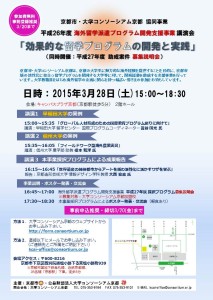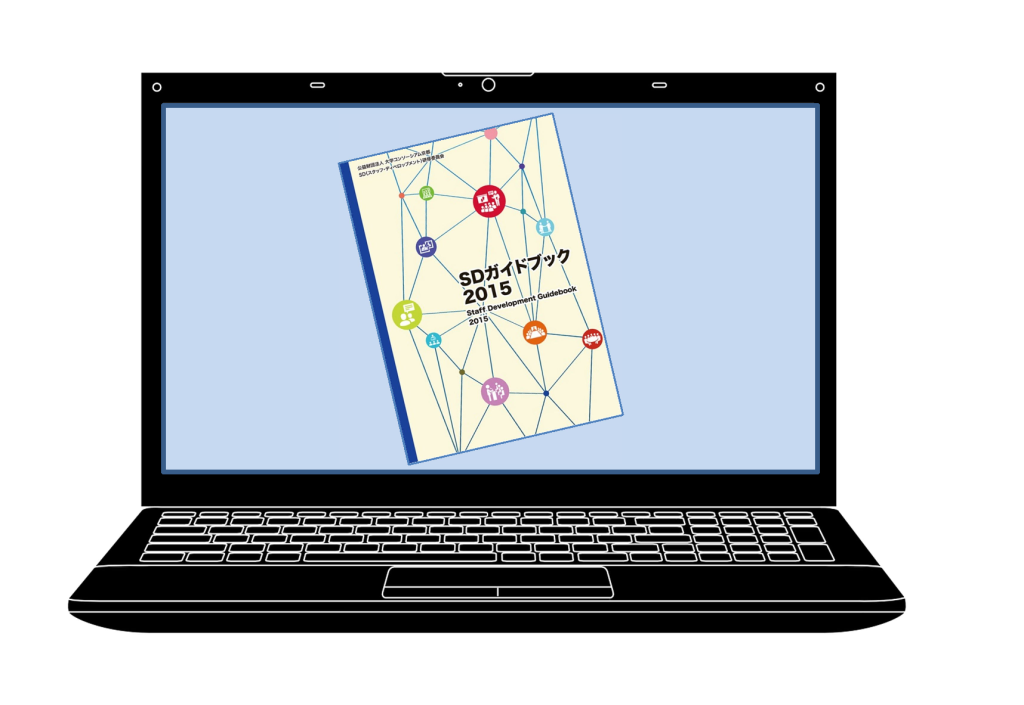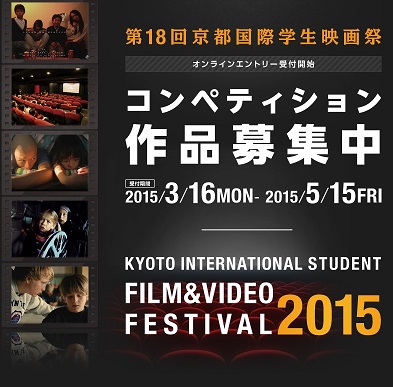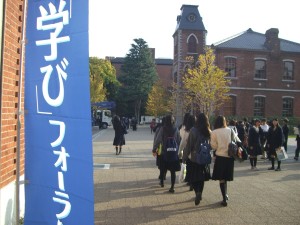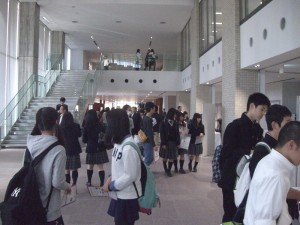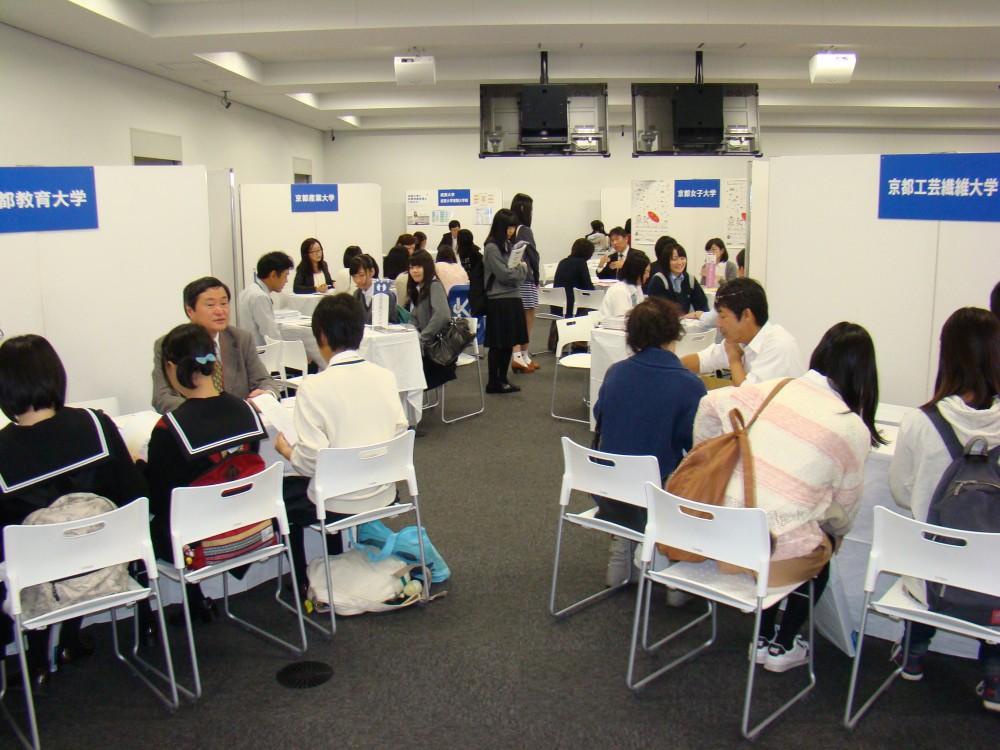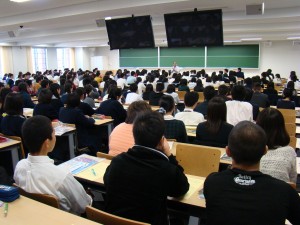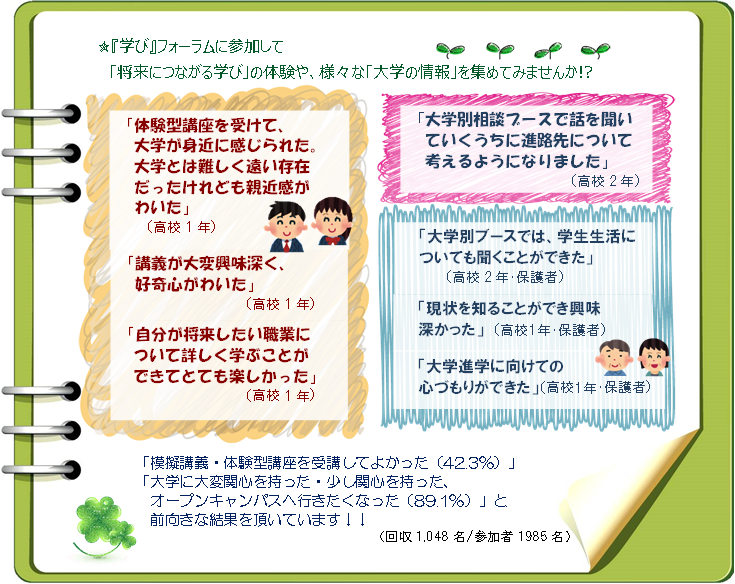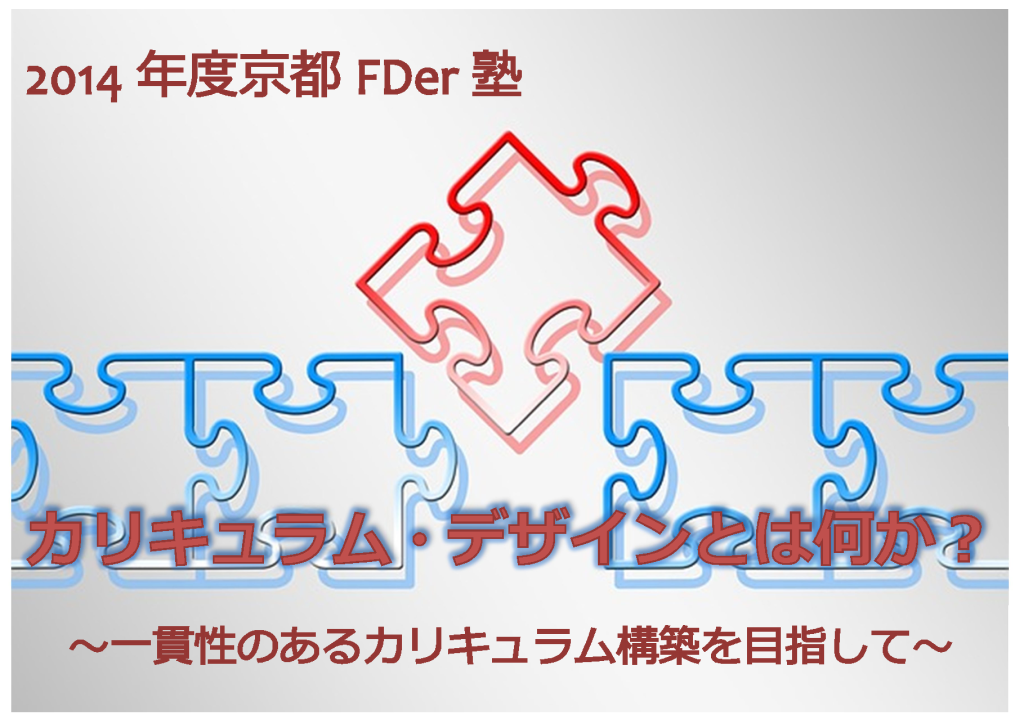Each of the survey and research themes adopted in the 2014 “Future Kyoto Creative Research Project” is working toward unknown results. We will introduce the state of the site!
Future Kyoto Creation Research Project Survey and Research Themes in FY2014
Held a rough roundtable meeting between Kyoto companies and international students –
Designated Project 3 “Analysis of Trends in Employment of International Students After Graduation from University and Research on Support Measures in Local Governments, Companies, and Universities”
On the evening of February 3, when the research was finally in its prime, the research group of Professor Kazuhiko Ishihara of the Ritsumeikan University Career Center, which is conducting the research, held a rough roundtable discussion to deepen mutual understanding between international students and Kyoto companies before job hunting.
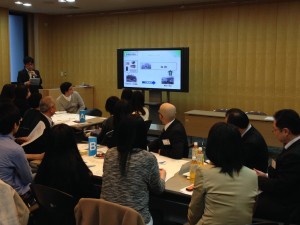
An overview of the company was given by a Kyoto company.
At this roundtable meeting, which was attended by 7 Kyoto companies and 25 international students, the participants were divided into groups and discussed the theme of “Why do companies hire international students and what companies do international students want to work for?”
In a rough atmosphere, Kyoto companies expressed their expectations for international students to play a role as a bridge for vitality and overseas expansion, and international students spoke frankly about communication based on cultural differences and concerns about Japan’s corporate culture.
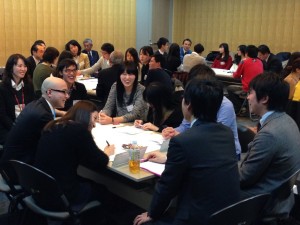
We talked about the expectations of Kyoto companies and the concerns of international students.
Through the results of this roundtable discussion and questionnaire survey, we plan to compile proposals for capacity building programs for international students and Kyoto companies, as well as measures to improve the working environment for international students by Kyoto City.
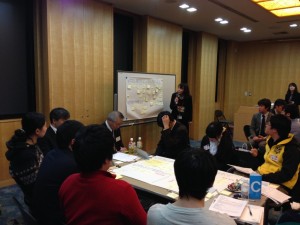
At the end, the opinions of each group were shared as a whole.
The University Consortium Kyoto has high hopes for the research results that will benefit Kyoto companies, Kyoto universities, and Kyoto City!
Conducting a field survey of the garden of a Kyoto machiya –
Ongoing Theme: “The Environment of Residential Gardens and the Impact of Their Reduction on Biota”
Mr./Ms. Niino and three members of Professor Shozo Shibata’s seminar at the Graduate School of Agriculture, Kyoto University, who are conducting the research, are conducting a field survey of the gardens of Kyomachiya houses that are more than 100 years old in the Nishijin area.
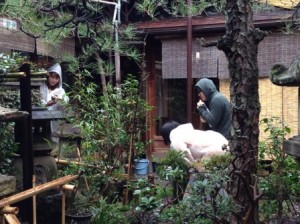
We are carefully investigating the vegetation in the garden of Kyomachiya.
In order to clarify the relationship between the distribution of Kyomachiya and old residential gardens and the biota of birds, Mr./Ms. Niino and other members of the Kyomachiya were actually surveyed as part of a questionnaire survey of residents of houses with gardens in the Momozono School District, Kamigyo-ku, along with interviews with residents.
On Thursday, December 4, the survey was conducted in a light rain.
We will carefully listen to the plants in the garden, the types of birds that fly, the status of garden care, etc., and put them down in the diagram.
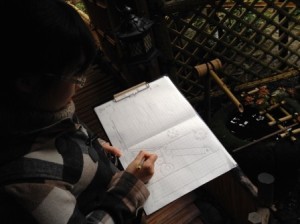
I will drop the state of the garden into a diagram.
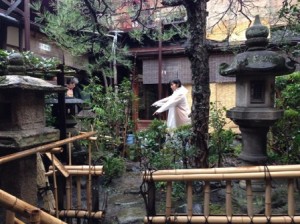
We will talk to the owner of the garden about the types of birds that fly.
There are things that you can’t understand unless you see the site, and Mr./Ms. Niino works tirelessly to create new developments by seeing them. This research, which focuses on the spatial distribution of Kyomachiya gardens and the creatures that inhabit them, is unprecedented, and we are looking forward to seeing the results.
Collaboration project with Chukyo Machibito Café –
Designation Project 2 “Creating a Place for Exchange in Urban Areas”
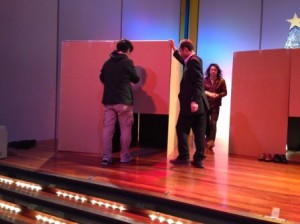
Cardboard tea room. If you talk about it inside, you may come up with ideas that you haven’t thought of before…
On the evening of Thursday, November 27, a collaboration event with Chukyo Machibito Café was held at Shinpukan in Nakagyo-ku as part of the “Tea Essay Proposal-an Project,” which aims to “create a place for exchange in the city of Kyoto with the theme of commerce” through the collaboration of Professor Masanobu Nishimura of Kyoto Institute of Technology and the Kyoto City Commercial Promotion Division.
I love the town of Chukyo and want to do something! It was a place where “Machibito” and “Akinaibito”, a merchant, mingled and talked passionately in a real café as a venue, writing down their thoughts on creating the future of business in the city of Kyoto on paper napkins.
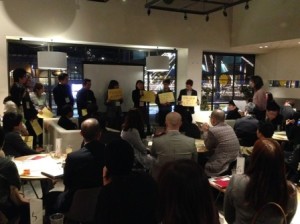
We are looking for themes to discuss the future of business in the city of Kyoto.
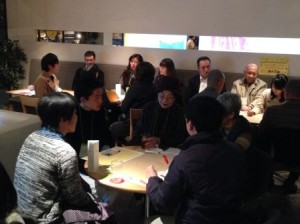
At each table, heated discussions ensued.
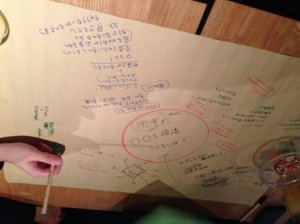
Participants wrote down their thoughts.
In order to create a place where the ideas that jump out from the participants will become the threads that will weave the future of business in the city of Kyoto, further trials of the Charonsukan project will continue.
Conducting on-site surveys in municipal housing –
Freedom Project 1 “Spatial Composition and Transition in Municipal Housing and Surrounding Residential Areas in the Suburbs of Kyoto City”
In this survey and research theme, in collaboration with the Kyoto City Housing and Community Development Division, we are trying to clarify the relationship between municipal housing in the suburbs of the city’s 99 housing complexes and the surrounding area from (1) the exterior of the buildings bordering the housing complex, (2) the use of open space in the housing complex, and (3) the situation of the site boundary. The results of the survey are expected to be used in the development and reorganization of municipal housing in the future.
On Wednesday, September 17, the principal investigator, Mr./Ms. Masaki, a doctoral student at Kyoto Institute of Technology, conducted his third on-site survey at a municipal housing complex in Yamashina Ward. (The past two meetings were held in Yamashina Ward and Fushimi Ward in August.)
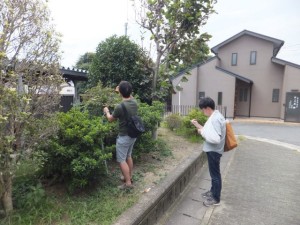
Measure the height and depth of the planting.
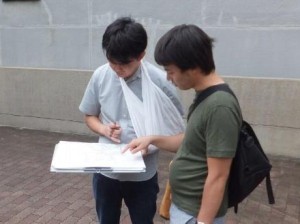
On the left is Mr./Ms. Masaki, the principal investigator, and on the right is Mr./Ms. Inagaki, a collaborator.
In order to clarify the relationship between municipal housing and the surrounding area, we will take photographs of the boundary between the local municipal housing site and the road and the site, and carefully record the dimensions and the width of the adjacent road.
We will also check the state of the open space on the site and the status of entrances and exits outside the site.
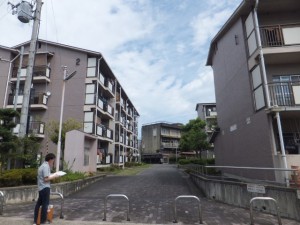
It is also important to know what the entrance, which is the boundary between municipal housing and the local area, looks like.
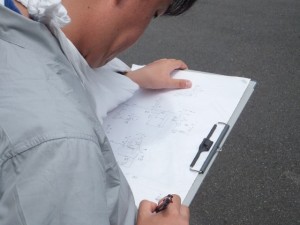
I will carefully drop it into the diagram.
By analyzing the results of these surveys on multiple municipal housing projects and materials on the transition of municipal housing, and deciphering the characteristics of the local environment around municipal housing, it will be useful for considering the consolidation of municipal housing stock in the future. In fact, the results of such a survey were unlikely to occur before.
Experiments in creating the future start in the tea room –
Designation Project 2 “Creating a Place for Exchange in Urban Areas”
In this survey and research theme, we will conduct empirical research to foster and network the formation of merchants, businesses, and citizens who promote the rediscovery and creation of “local value” through “creating a place for exchange” that takes advantage of the attractiveness of local resources accumulated in the city center.
On the evening of Wednesday, August 27, a new place for exchange was established in the “Demonstration Experiment on the Development of Merchants and Citizens and the Formation of Networks by Creating a Place for Exchange” conducted by Professor Masanobu Nishimura of the Graduate School of Craft and Sciences of Kyoto Institute of Technology in collaboration with the Kyoto City Commercial Promotion Division.
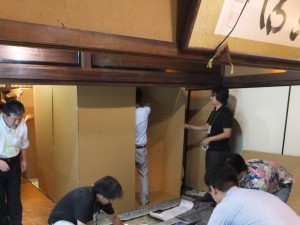
We will make a tea room out of cardboard.
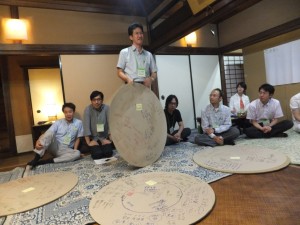
We share the content of the discussion.
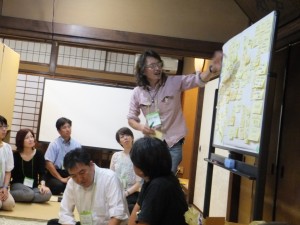
A lot of ideas popped up.
At the “Future Session,” which was accompanied by a surprising gimmick to create a tea room out of cardboard in a townhouse that was more than 100 years old, participants from a variety of attributes, including local merchants, shared ideas necessary for the future of the town with their eyes shining.
Based on these, various entities such as merchants, businesses, citizens, and artists will connect and create a “place” to create. In a few years, the city may look completely different from what it is now.
Future Kyoto Creation Research Project Survey and Research Themes in FY2014
Contact us
University Consortium Kyoto Think Tank Project
TEL 075-708-5803 FAX 075-353-9101
〒600-8216 Shimogyo-ku, Kyoto-shi, Nishitoin-dori, Shiokoji, Shimo-ku, Kyoto, Campus Plaza Kyoto
* Reception hours: Tuesday ~ Saturday 9:00 ~ 17:00 (excluding year-end and New Year holidays)














